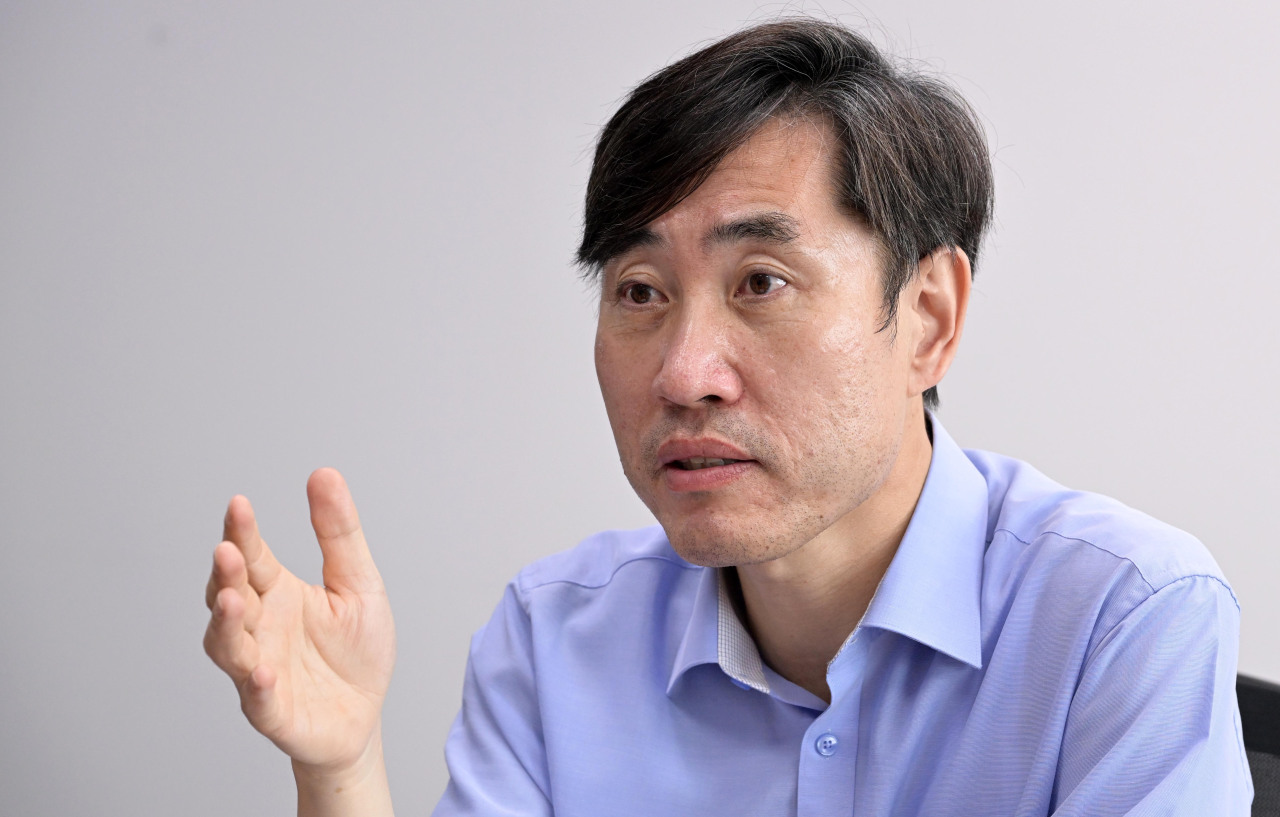
Rep. Ha Tae-keung speaks to The Korea Herald at his office at the National Assembly building in Yeouido, central Seoul, last week. (The Korea Herald)
The family of Otto Warmbier has set an important precedent for North Korea victims all over, according to Rep. Ha Tae-keung of the ruling People Power Party.
Speaking with The Korea Herald, the ruling People Power Party Rep. Ha Tae-keung said, “The Warmbier family has played a pivotal role in the fight against North Korea human rights abuses, and their efforts have marked a significant turning point in accountability-seeking.”
About a month ago, Ha met with Cindy and Fred Warmbier, the parents of Otto Warmbier, who died in 2017 after suffering a brain injury while being held prisoner in North Korea. The lawmaker was at the meeting with the Warmbiers alongside Lee Rae-jin, whose younger brother Dae-jun, a South Korean Ministry of Oceans and Fisheries official, was fatally shot by North Korean soldiers at sea in 2020.
Ha said that his “most memorable moment” from his US trip as the chair of the International Parliamentarians’ Coalition for North Korean Refugees and Human Rights last month was the meeting with the two families.
“Oftentimes North Korea human rights movements could feel stunted, and like hollow cries that do not echo, because the North Korean regime would not even flinch,” he said.
“The experience of a victory, and the accumulation of such experiences, are important fuel that can keep a movement like this going, and not let it get bogged down by the grueling fight.”
Ha said that the Warmbier family set an example by showing it’s possible to make North Korea pay without necessarily having to get the regime to engage. In 2018, the Warmbiers won a wrongful death suit at a Washington court, which ordered North Korea to pay them more than half a billion dollars in damages.
“For victims of North Korea human rights abuses everywhere, this is a monumental feat,” he said. With the Warmbiers’ court victory, a “new path has been paved for victims to seek compensations,” and that it has “revitalized the movement.”
Cutting the Kim Jong-un regime off its source of income, Ha said, would be the “most effective way” to get North Korea to change its behavior and comply with international human rights standards.
Ha said he planned on helping more victims seek accountability and receive reparations in the similar way the parents of Warmbier had.
“One of the ways I have proposed is an annual conference held regularly, either online or in person, to gather North Korea human rights violations victims, and to allow them share their experiences at courts and updates on North Korean assets all over the world,” he said.
At the National Assembly, he said he was preparing a legislation for imposing some sanctions on North Korea -- much like the US legislation named after Otto Warmbier.
“The idea is to create more routes for holding North Korea accountable, financially. You wrong us, you pay,” he said. “What can be done in South Korea can only differ from what can be done in the US. We are speaking with the families (of victims) and looking for ways on how to best approach this.”
Ha has been one of the most vocal advocates for North Korea victims in South Korean politics, including the victims in some of the most high-profile controversies when Moon Jae-in was president.
He said how the Moon administration handled North Korea’s killing of the South Korean official and the two North Korean fishermen’s attempted defection in particular had been a “failure in upholding humanitarian and human rights obligations.”
“The administration proved it was capable of trampling on human rights and universal values and principles, as a means to promote its agenda,” Ha said.
Ha said that the case of Lee Dae-jun, the fisheries official who was shot and then burned by North Korean soldiers after he went missing off a patrol ship, was “one of the most fundamental ways the government failed its own citizen.” “After he died, he was defamed by the Moon administration officials who called him a defector,” he said.
Ha headed the People Power Party’s fact-finding task force after the Coast Guard and the Ministry of National Defense in June announced that they found no evidence to prove the late official had tried to defect to North Korea.
Last month, he and fellow South Korean member lawmakers on the International Parliamentarians’ Coalition for North Korean Refugees and Human Rights decided to disclose the identities of two North Korean fishermen who were forcibly repatriated.
“We decided to name them to prevent North Korea from possibly hurting them, if they are still alive. Revealing their identities also humanizes them because it allows people to see them as people, and not just nameless figures in the news,” he said.
“What happened to the young men may be a serious violation of the principle of non-refoulement.”
Ha said what sets the Yoon Suk-yeol adminsitration apart from the preceding administration is where it stands on North Korea and its human rights abuses.
“We are already seeing a significant shift, including an appointment of an ambassador for North Korea human rights issues,” he said.
The Moon administration and his Democratic Party were “weak on North Korea human rights, to say the least.”
Just recently South Korea lost its reelection bid for a membership on the United Nations Human Rights Council for the first time since it held a seat as a founding member in 2006.
Ha said that with Yoon as president, human rights diplomacy was anticipated to “come to the fore.”
“For so long South Korea’s alliance with the US was almost solely concerned on defense and security,” he said. “Under the current administration, building a stronger relationship with the US on the human rights front, too, will be among top priorities.”






